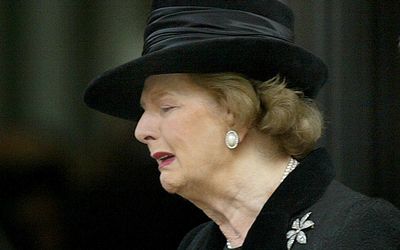FOR black South Africans in search of a powerful defence of affirmative action, whose story is best to tell? Whose career provides the greatest inspiration?
Margaret Thatcher would probably not make it into the top 100 on anyone’s list. But the world is full of surprises.
In 1958, Thatcher, a 32-year-old mother of two small children, competed to become the Conservative Party’s parliamentary candidate for Finchley in North London.
She was up against three men. Each was considerably older and more established than she.
This was not the first time Thatcher had tried to stand for parliament. She had been a member of the Conservatives for more than a decade and had run and lost two previous campaigns to compete for a parliamentary candidacy.
Possessed of preternatural energy, she was nonetheless tiring; even the most persistent cannot repeatedly beat their heads against a brick wall.
The day before the Conservatives of Finchley were to select their candidate, Thatcher wrote a resigned letter to her sister Muriel.
"I expect the usual prejudice against women will prevail," Thatcher wrote, "and that I shall probably become the inevitable ‘close second’."
By all accounts, Thatcher was brilliant on the evening of the selection. Young, lucid and formidably clever, she came across as a natural-born leader.
When he counted the votes, the chairman of the Finchley branch of the Conservative Party, Bertie Blatch, found that Thatcher had very narrowly come second.
And so, he quietly slipped a couple of ballots from her opponent’s pile to hers and declared her the winner. When he got home that night, Blatch confessed what he had done to his son, Haden. "She actually didn’t win," he said, "the man did, but I thought, ‘He’s a got silver spoon in his mouth. He’ll get another seat.’"
Finchley was a Conservative safe seat. At the next general election, Thatcher won easily, beginning a career that would culminate in one of the most famous British premierships of the 20th century.
Thatcher never discovered the true story of how she got into parliament. It was decades later that Haden Blatch told the tale to Thatcher’s biographer, Charles Moore. By then, Thatcher was in the depths of Alzheimer’s disease and would probably not have understood.
What transpired that evening in Finchley was a home-grown act of affirmative discrimination. Blatch understood that Thatcher lost only because her prospective constituents were blind to her potential.
And they were blind because they were mired in generations of prejudice.
Strictly speaking, he cheated. At a deeper level, he righted a wrong.
I tell this story here and now because there is a low-intensity conflict under way between SA’s black and white professionals and it appears to grow more bitter by the week. Affirmative discrimination is at the centre of this conflict. Increasingly, what one thinks of it is no more than an expression of one’s racial identity.
For many black people, it is a battering ram with which to break the walls of an old establishment. For many white people, it is a self-serving ideology that the mediocre use to acquire jobs they do not deserve.
If this racial polarisation sets into concrete, affirmative action will have failed. Instead of unleashing the talent that prejudice suppresses, it will become the mechanism through which SA’s professions balkanise and fight.
Universities with two parallel professoriates; a legal profession with two parallel bars of advocates — in short, a country in which black and white literally cannot share the same space.
The world I am describing here is one of mutual destruction, a truly ghastly place in which some of the most important institutions in South African society become irreparably deformed.
I am writing from the heart. As a teacher, I have had the privilege of teaching brilliant students who would not be where they are without affirmative discrimination; students whose talent would have remained forever suppressed because they were black people trying to get into a world too long controlled by whites.
This is what affirmative action does. But to do its work, it must be a common project, one that everybody believes in.
It would be a travesty if future generations of talent were to come to nothing because the policies designed to do them justice were mangled in a racial war.
• Steinberg teaches African studies at Oxford University and is a visiting professor at the Wits Institute for Social and Economic Research

Margaret Thatcher leaves a service of remembrance in London for her late husband Sir Denis Thatcher in this October 30 2003 file photo. Picture: REUTERS
FOR black South Africans in search of a powerful defence of affirmative action, whose story is best to tell? Whose career provides the greatest inspiration?
Margaret Thatcher would probably not make it into the top 100 on anyone’s list. But the world is full of surprises.
In 1958, Thatcher, a 32-year-old mother of two small children, competed to become the Conservative Party’s parliamentary candidate for Finchley in North London.
She was up against three men. Each was considerably older and more established than she.
This was not the first time Thatcher had tried to stand for parliament. She had been a member of the Conservatives for more than a decade and had run and lost two previous campaigns to compete for a parliamentary candidacy.
Possessed of preternatural energy, she was nonetheless tiring; even the most persistent cannot repeatedly beat their heads against a brick wall.
The day before the Conservatives of Finchley were to select their candidate, Thatcher wrote a resigned letter to her sister Muriel.
"I expect the usual prejudice against women will prevail," Thatcher wrote, "and that I shall probably become the inevitable ‘close second’."
By all accounts, Thatcher was brilliant on the evening of the selection. Young, lucid and formidably clever, she came across as a natural-born leader.
When he counted the votes, the chairman of the Finchley branch of the Conservative Party, Bertie Blatch, found that Thatcher had very narrowly come second.
And so, he quietly slipped a couple of ballots from her opponent’s pile to hers and declared her the winner. When he got home that night, Blatch confessed what he had done to his son, Haden. "She actually didn’t win," he said, "the man did, but I thought, ‘He’s a got silver spoon in his mouth. He’ll get another seat.’"
Finchley was a Conservative safe seat. At the next general election, Thatcher won easily, beginning a career that would culminate in one of the most famous British premierships of the 20th century.
Thatcher never discovered the true story of how she got into parliament. It was decades later that Haden Blatch told the tale to Thatcher’s biographer, Charles Moore. By then, Thatcher was in the depths of Alzheimer’s disease and would probably not have understood.
What transpired that evening in Finchley was a home-grown act of affirmative discrimination. Blatch understood that Thatcher lost only because her prospective constituents were blind to her potential.
And they were blind because they were mired in generations of prejudice.
Strictly speaking, he cheated. At a deeper level, he righted a wrong.
I tell this story here and now because there is a low-intensity conflict under way between SA’s black and white professionals and it appears to grow more bitter by the week. Affirmative discrimination is at the centre of this conflict. Increasingly, what one thinks of it is no more than an expression of one’s racial identity.
For many black people, it is a battering ram with which to break the walls of an old establishment. For many white people, it is a self-serving ideology that the mediocre use to acquire jobs they do not deserve.
If this racial polarisation sets into concrete, affirmative action will have failed. Instead of unleashing the talent that prejudice suppresses, it will become the mechanism through which SA’s professions balkanise and fight.
Universities with two parallel professoriates; a legal profession with two parallel bars of advocates — in short, a country in which black and white literally cannot share the same space.
The world I am describing here is one of mutual destruction, a truly ghastly place in which some of the most important institutions in South African society become irreparably deformed.
I am writing from the heart. As a teacher, I have had the privilege of teaching brilliant students who would not be where they are without affirmative discrimination; students whose talent would have remained forever suppressed because they were black people trying to get into a world too long controlled by whites.
This is what affirmative action does. But to do its work, it must be a common project, one that everybody believes in.
It would be a travesty if future generations of talent were to come to nothing because the policies designed to do them justice were mangled in a racial war.
• Steinberg teaches African studies at Oxford University and is a visiting professor at the Wits Institute for Social and Economic Research




















Change: 0.80%
Change: 0.61%
Change: -0.25%
Change: 0.13%
Change: 4.02%
Data supplied by Profile Data
Change: 1.13%
Change: 0.37%
Change: 0.80%
Change: 0.00%
Change: 0.33%
Data supplied by Profile Data
Change: -2.03%
Change: -1.51%
Change: -1.45%
Change: -2.26%
Change: -0.91%
Data supplied by Profile Data
Change: 0.07%
Change: 3.71%
Change: 2.65%
Change: 3.36%
Change: 4.99%
Data supplied by Profile Data